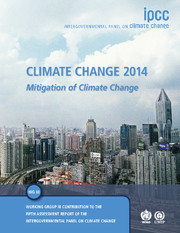 Climate Change 2014: Mitigation of Climate Change
Climate Change 2014: Mitigation of Climate Change Book contents
- Frontmatter
- Foreword, Preface, Dedication and In Memoriam
- Contents
- Summary for Policymakers
- Technical Summary
- Chapters
- Chapter 1 Introductory Chapter
- Chapter 2 Integrated Risk and Uncertainty Assessment of Climate Change Response Policies
- Chapter 3 Social, Economic, and Ethical Concepts and Methods
- Chapter 4 Sustainable Development and Equity
- Chapter 5 Drivers, Trends and Mitigation
- Chapter 6 Assessing Transformation Pathways
- Chapter 7 Energy Systems
- Chapter 8 Transport
- Chapter 9 Buildings
- Chapter 10 Industry
- Chapter 11 Agriculture, Forestry and Other Land Use (AFOLU)
- Chapter 12 Human Settlements, Infrastructure, and Spatial Planning
- Chapter 13 International Cooperation: Agreements & Instruments
- Chapter 14 Regional Development and Cooperation
- Chapter 15 National and Sub-national Policies and Institutions
- Chapter 16 Cross-cutting Investment and Finance Issues
- Annexes
- Index
Chapter 14 - Regional Development and Cooperation
from Chapters
Published online by Cambridge University Press: 05 February 2015
- Frontmatter
- Foreword, Preface, Dedication and In Memoriam
- Contents
- Summary for Policymakers
- Technical Summary
- Chapters
- Chapter 1 Introductory Chapter
- Chapter 2 Integrated Risk and Uncertainty Assessment of Climate Change Response Policies
- Chapter 3 Social, Economic, and Ethical Concepts and Methods
- Chapter 4 Sustainable Development and Equity
- Chapter 5 Drivers, Trends and Mitigation
- Chapter 6 Assessing Transformation Pathways
- Chapter 7 Energy Systems
- Chapter 8 Transport
- Chapter 9 Buildings
- Chapter 10 Industry
- Chapter 11 Agriculture, Forestry and Other Land Use (AFOLU)
- Chapter 12 Human Settlements, Infrastructure, and Spatial Planning
- Chapter 13 International Cooperation: Agreements & Instruments
- Chapter 14 Regional Development and Cooperation
- Chapter 15 National and Sub-national Policies and Institutions
- Chapter 16 Cross-cutting Investment and Finance Issues
- Annexes
- Index
Summary
Introduction
14.1.1 Overview of issues
This chapter provides an assessment of knowledge and practice on regional development and cooperation to achieve climate change mitigation. It will examine the regional trends and dimensions of the mitigation challenge. It will also analyze what role regional initiatives, both with a focus on climate change and in other domains such as trade, can play in addressing these mitigation challenges.
The regional dimension of mitigation was not explicitly addressed in the IPCC Fourth Assessment Report (AR4). Its discussion of policies, instruments, and cooperative agreements (Working Group III AR4, Chapter 13) was focused primarily on the global and national level. However, mitigation challenges and opportunities differ significantly by region. This is particularly the case for the interaction between development/growth opportunities and mitigation policies, which are closely linked to resource endowments, the level of economic development, patterns of urbanization and industrialization, access to finance and technology, and—more broadly—the capacity to develop and implement various mitigation options. There are also modes of regional cooperation, ranging from regional initiatives focused specifically on climate change (such as the emissions trading scheme (ETS) of the European Union (EU)) to other forms of cooperation in the areas of trade, energy, or infrastructure, that could potentially provide a platform for delivering and implementing mitigation policies. These dimensions will be examined in this chapter.
Specifically, this chapter will address the following questions:
• Why is the regional level important for analyzing and achieving mitigation objectives?
• What are the trends, challenges, and policy options for mitigation in different regions?
• To what extent are there promising opportunities, existing examples, and barriers for leapfrogging in technologies and development strategies to low-carbon development paths for different regions?
• What are the interlinkages between mitigation and adaptation at the regional level?
• To what extent can regional initiatives and regional integration and cooperation promote an agenda of low-carbon climate-resilient development? What has been the record of such initiatives, and what are the barriers? Can they serve as a platform for further mitigation activities?
- Type
- Chapter
- Information
- Climate Change 2014: Mitigation of Climate ChangeWorking Group III Contribution to the IPCC Fifth Assessment Report, pp. 1083 - 1140Publisher: Cambridge University PressPrint publication year: 2015
- 2
- Cited by


